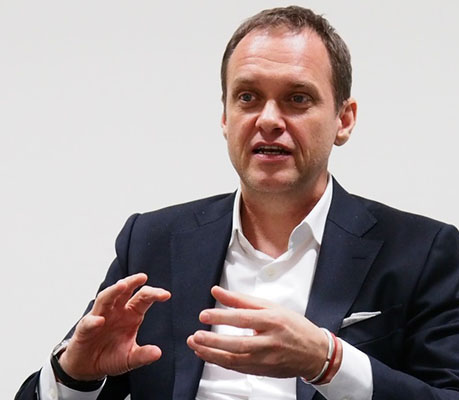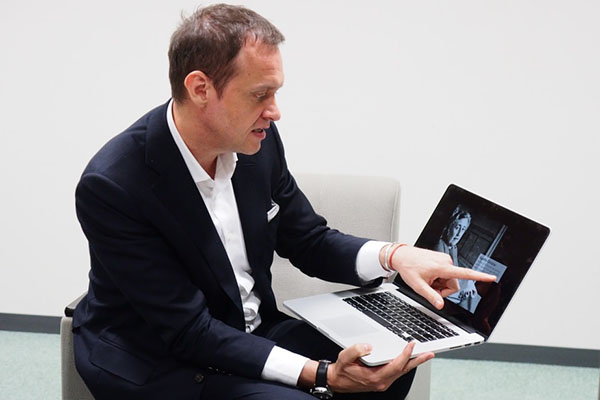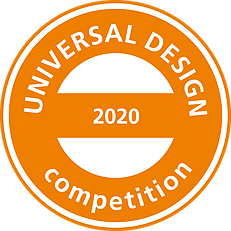2017.06.22
[Global Interview 2016] It will be great if the year 2020 becomes a good opportunity for the whole society to raise awareness of design, thereby changing the society for the better.
2017.06.20 Updated

Rainer Wessler
Vice President of Design, Frog Design Inc., USA
Interviewer: Kazuaki Kitamura (Information Exchange Center / Okamura Corporation)
Interview date: Dec. 9, 2016 PM 18:10-
—Thank you for taking time out of your busy schedule for us today.
Rainer Wessler: Thank you for inviting me.
—What is your impression about Japan and Nagoya?
Rainer Wessler: Originally, I have been focusing on Asia in my career. I was assigned in charge of Asia seven years ago. So Japan is always close to me, and I think Japan is a very nice place because I can feel unique viewpoints. I live in China now, but I still think that Japan is an attractive country. I feel the same way for design.
I have visited Nagoya for the first time, and I have the impression that this is a very nice place. I am very interested in Nagoya because it is a city of manufacturing. As seen in China where I live, things are rapidly developing now, which always comes with manufacturing. So I also have a very good impression about design because objects are highly constructive.
—You have given a speech today. What was your impression about this conference?
Rainer Wessler: First of all, I am very impressed by the conference because many participants are high-profile and intellectual. The sponsors are outstanding companies. So I feel that universal design is regarded as very important for today’s Japan. In particular, as seen in the distribution of population, the Japanese society is aging. This is a good opportunity to do something for other people.
In addition, the attendance of Her Imperial Highness Princess Yohko added value to the conference.
I also noticed that participants were in older age groups. I believe that this makes this conference high-profile in a good sense. This is my personal opinion, so may be wrong. But in fact, I feel that both people involved in design (designers) and experts are gathered together.
—Thank you. The next question. When you, as a representative of your design company, work with various clients, what do you pay attention to in terms of universal design in order to meet your clients’ needs and make designs? Can you tell us if any?
Rainer Wessler: Business segments of our clients are diversifying. I think that one of today’s trends is “connected nursing care”. I was raised in a small, highly-populated country, so care givers and receivers were well balanced in my hometown. Care givers and receivers were in same places. For example, my parents took care or my grandparents. However, as the trend of nuclear families is increasing in modern society, care is being provided in different ways. This requires people to become self-reliant. Rather than interdependent nursing care, more needing are remote care and highly social care.
A big problem in today’s China is a reverse population pyramid that is expected to come in several years. So I feel that new concepts of nursing care and care receivers are needed.
Another thing is that nowadays our clients tend to request not special designs for producing goods for certain purposes, but customer-oriented designs or designs for change and innovation.
This means that our clients are seeking not the creation of things with innovative ideas, but the innovation and change of things. In fact, this trend has started in Australia and Singapore and is now being seen in North Asia and China.
Another trend is silent computing. For example, we now recognize that computers are being replaced by smartphones and mobile phones, but we at Frog are predicting that houses and cars per se will be used as computers in the future. Even today, we are seeing cars as computers with wheels. This means that houses and cars detect environments and situations to identify things based on our behaviors and habits and then advise us what to do next. This is actually occurring. New systems, which replace thermostats (temperature controllers) and provide support and assistance to our life styles, will be developed.
To take technology as an example, it may be possible for our devices used in our daily lives to detect and read the information that we get up at seven o’clock every morning, make and drink coffee, and take a bath. Based on information that we feel and obtain in our daily lives, our health and hygienic conditions will be assessed and collected. Software will be much smarter. With these, changes in our daily lives will be identified. I take an example to clarify the point I have explained earlier.
Agatha Christie, a novelist everyone knows in the West, continued writing, I believe, for 70 years. Her many works are very unique. There was a Canadian male linguist who selected her works and analyzed them from an algorithmic perspective. This Canadian linguist was also a software programmer. He analyzed and examined the diversity, category, use frequency, and ambiguity of words used in her works. He found that her words became less diverse and more ambiguous around her age of 62. When studying her works from 1983 when she turned 62 years old till when she became 85 years old, it was found that changes occurred in this period. Even after her age of 62, her books have sold well, but the study results show that she might suffer from Alzheimer's disease or dementia, and the linguist said that these changes to her works might be a sign of dementia.

Like silent computing I have mentioned earlier, I think that houses per se will monitor human behavior to recognize changes in our daily habits, thereby identifying our health conditions and others. Systems of this kind will be developed. I often use this story as an example, and the point of this example is that shared data or collected data may lead us to unexpected conclusions.
I think that Agatha Christie herself did not want to show her mental conditions in her works, but the fact turned out to be known. This is a very interesting case example in my opinion. This demonstrates that collected data create new viewpoints. This may not be relevant directly to your question, but I have shared this example.
—Introducing software to houses can monitor household conditions, which is a great idea.
Rainer Wessler: That’s right. This could happen. It is true that different kinds of information can be obtained depending on how we use goods and tools. With only one tool or device, we may not be able to gain a significant thing, but adding more to it could make that happen. I don’t have solid evidence, but I still believe so.
—Thank you. This is my last question. Toward the 2020 Tokyo Olympics and Paralympics, do you have any advice or expectations for our organization and Japan?
Rainer Wessler: First of all, I would like to extend my congratulations to Japan for having been selected as the venue for the Games, which is great because this will be a good opportunity to disseminate and promote universal design. From a different perspective, I hope that Japan and the organization take this opportunity and put pressure on themselves to work harder to promote universal design.
At the same time, it will disseminate universal design to people in a more visible way. One thing I expect is that design is not only used for goods and services but goes beyond that and turns into something that facilitates communication between goods, encouraging people to think about design and take design into them. Usually, design is made by designers only, but if the entire society becomes aware of design, the society will change for the better.
Of course, I will come to Japan before and after the Games to see changes in Japan for myself.
I am sorry for having being a little off the track. It is nice talking about my opinions and thoughts and I appreciate your giving me this opportunity.
—Thank you very much for your time today.
Web site: https://www.frogdesign.com/
Inquiries
Please make your inquiry here (you will be automatically transferred to the Inquiries page).






![[Global Interview 2016] It would be very appreciated if Japan or IAUD could provide and share information and strategies to Europe. 画像](https://www.iaud.net/file/en/sites/3/03bade-1-320x289.jpg)
![[Global Interview 2016] It will be wonderful if the first-ever united Games of the Olympics for non-handicapped people and the Paralympics for handicapped people is realized in Japan in 2020. 画像](https://www.iaud.net/file/en/sites/3/04balaram-1-320x172.jpg)
![[Global Interview 2016] It will be great if the year 2020 becomes a good opportunity for the whole society to raise awareness of design, thereby changing the society for the better. 画像](https://www.iaud.net/file/en/sites/3/01wessler-1-320x279.jpg)
